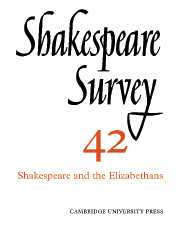Book contents
- Frontmatter
- ‘Jack hath not Jill’: Failed Courtship in Lyly and Shakespeare
- Truth and Art in History Plays
- Chronicles and Mythmaking in Shakespeare’s Joan of Arc
- King John and Embarrassing Women
- Golding’s Ovid, Shakespeare’s ‘Small Latin’, and the Real Object of Mockery in ‘Pyramus and Thisbe’
- Ovid and the Sonnets; or, did Shakespeare Feel the Anxiety of Influence?
- The Play of Sir Thomas More and Some Contemporary Events
- ‘Nobody’s Perfect’: Actors’ Memories and Shakespeare’s Plays of the 1590s
- The Boyhood of Shakespeare’s Heroines
- Shakespeare’s ‘Brawl Ridiculous’
- Shakespeare’s Handwriting
- Shakespeare Performances in England, 1987–8
- Professional Shakespeare Productions in the British Isles, January-December 1987
- The Year's Contributions to Shakespearian Study 1 Critical Studies
- 2 Shakespeare’s Life, Times, and Stage
- 3 Editions and Textual Studies
- Books Received
- Index
The Year's Contributions to Shakespearian Study 1 - Critical Studies
Published online by Cambridge University Press: 28 March 2007
- Frontmatter
- ‘Jack hath not Jill’: Failed Courtship in Lyly and Shakespeare
- Truth and Art in History Plays
- Chronicles and Mythmaking in Shakespeare’s Joan of Arc
- King John and Embarrassing Women
- Golding’s Ovid, Shakespeare’s ‘Small Latin’, and the Real Object of Mockery in ‘Pyramus and Thisbe’
- Ovid and the Sonnets; or, did Shakespeare Feel the Anxiety of Influence?
- The Play of Sir Thomas More and Some Contemporary Events
- ‘Nobody’s Perfect’: Actors’ Memories and Shakespeare’s Plays of the 1590s
- The Boyhood of Shakespeare’s Heroines
- Shakespeare’s ‘Brawl Ridiculous’
- Shakespeare’s Handwriting
- Shakespeare Performances in England, 1987–8
- Professional Shakespeare Productions in the British Isles, January-December 1987
- The Year's Contributions to Shakespearian Study 1 Critical Studies
- 2 Shakespeare’s Life, Times, and Stage
- 3 Editions and Textual Studies
- Books Received
- Index
Summary
IDEOLOGY AND HISTORY
As a consequence of the reawakened interest in history as a mode of entrance into literary interpretation, Survey reviewers are beginning to have friendly demarcation disputes about what is 'Criticism' and what is 'Life and Times'. More and more commentators are coming to fashion criticism out of a close contextualization of Shakespeare's works. Having looked last year at new historicism as a movement, I want this time to examine more directly one of its underpinning concepts, ideology, a subject which was one of the themes at the Twenty-Third International Shakespeare Conference in 1988.
For those who are willing to jump in at the deep end, Shakespeare Reproduced: The Text in History and Ideology, edited by Jean E. Howard and Marion F. O'Connor (New York and London: Methuen, 1987), is the place to start. In their helpful Introduction, the editors explain how an ideological historicism differs from traditional 'historical background' studies:
One is interested not just in 'what the Elizabethans thought and did' as reflected in their literature, but in the uses of ideas and practices in producing a particular social order and subjects to work within it and in enabling, as well, points of resistance to dominant ideologies.
(p. 8)- Type
- Chapter
- Information
- Shakespeare Survey , pp. 163 - 185Publisher: Cambridge University PressPrint publication year: 1990

